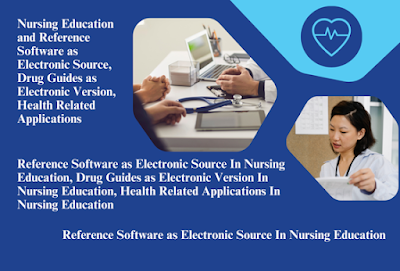The Reference Software as Electronic Source Drug Guides as Electronic Version Health Related Applications In Nursing Education. Health Related Applications In Nursing Education In the digital age, nursing education has been significantly transformed by the advent of electronic references, drug guides, and health-related applications. These tools offer numerous advantages over traditional print resources, enhancing both teaching and learning in nursing programs.
The Reference Software as Electronic Source Drug Guides as Electronic Version Health Related Applications In Nursing Education
Electronic references have revolutionized nursing education by offering portable and easily accessible versions of essential reference materials. These include drug information, laboratory test norms, medical terminology dictionaries, and guides to nursing diagnoses.
Advantages of Electronic References
- Portability and Accessibility: Electronic references allow students to carry a wealth of information on their mobile devices, reducing the need for bulky textbooks and enabling quick access to essential data anytime, anywhere.
- Up-to-Date Information: Most electronic references are sold on a subscription basis, which includes regular updates. This ensures that students and practitioners have access to the latest information and guidelines.
- Web-Based Access: Many electronic references provide web-based access, allowing students to use the material on various devices, including laptops and tablets.
Considerations for Faculty
Faculty should verify the usability of these references after the subscription period ends, as some may only be usable during the active subscription. Additionally, while mobile versions of reference texts offer convenience, they may lack the resale or transferability options of physical books.
Drug Guides as Electronic Versions in Nursing Education
Electronic drug guides offer several benefits over their print counterparts, making them a valuable resource for nursing students and professionals.
Benefits of Electronic Drug Guides
- Speed and Efficiency: Electronic drug guides enable users to quickly search for drug information by entering a few letters in the search box, significantly speeding up the retrieval process compared to the index-based search of paper guides.
- Frequent Updates: Unlike print guides, electronic versions can be updated daily via the Internet, ensuring that users have the most current information on new drugs, warnings, and banned substances.
- Additional Features: Many electronic drug guides include useful tools such as pill finders, drug dosage calculators, and drug interaction checkers. Some free guides also offer valuable information, though they may lack the comprehensive content and features of subscription-based guides.
Evaluating Drug Guides
When selecting an electronic drug guide, faculty should assess the content quality and the intuitiveness of the interface. Practicing with familiar drug names can help determine how easily information can be accessed.
Health-Related Applications in Nursing Education
Health-related applications have become an integral part of nursing education, offering tools for clinical calculations, patient assessments, and specialized reference needs.
Types of Health-Related Applications
- Clinical Calculators: These apps help with tasks such as calculating growth percentiles for children, determining insulin dosages, and converting units of measurement.
- Assessment Tools: Applications that assist in patient assessments using validated tools (e.g., pain scales, neurologic assessments) can quickly calculate scores and aid in clinical decision-making.
- Specialized Tools: Some apps are designed for specific health monitoring tasks, such as electrocardiographic monitoring, blood testing, and glaucoma screening.
Selecting and Using Health-Related Applications
- App Evaluation: Faculty and students should download and test several similar apps to evaluate their quality, usability, and relevance to the educational or clinical setting.
- Data Accuracy: It is crucial to ensure that the data provided by the apps is based on recent research or peer-reviewed content.
- Cost Considerations: Evaluate the cost of the apps, including any licensing or subscription fees, against the benefits they offer to students.
Incorporating electronic references, drug guides, and health-related applications into nursing education not only enhances learning but also prepares students for the modern healthcare environment. By leveraging these digital tools, educators can provide a more interactive and up-to-date educational experience.
Read More:
https://nurseseducator.com/didactic-and-dialectic-teaching-rationale-for-team-based-learning/
https://nurseseducator.com/high-fidelity-simulation-use-in-nursing-education/
First NCLEX Exam Center In Pakistan From Lahore (Mall of Lahore) to the Global Nursing
Categories of Journals: W, X, Y and Z Category Journal In Nursing Education
AI in Healthcare Content Creation: A Double-Edged Sword and Scary
Social Links:
https://www.facebook.com/nurseseducator/
https://www.instagram.com/nurseseducator/
https://www.pinterest.com/NursesEducator/
https://www.linkedin.com/in/nurseseducator/
https://www.researchgate.net/profile/Afza-Lal-Din
https://scholar.google.com/citations?hl=en&user=F0XY9vQAAAAJ
